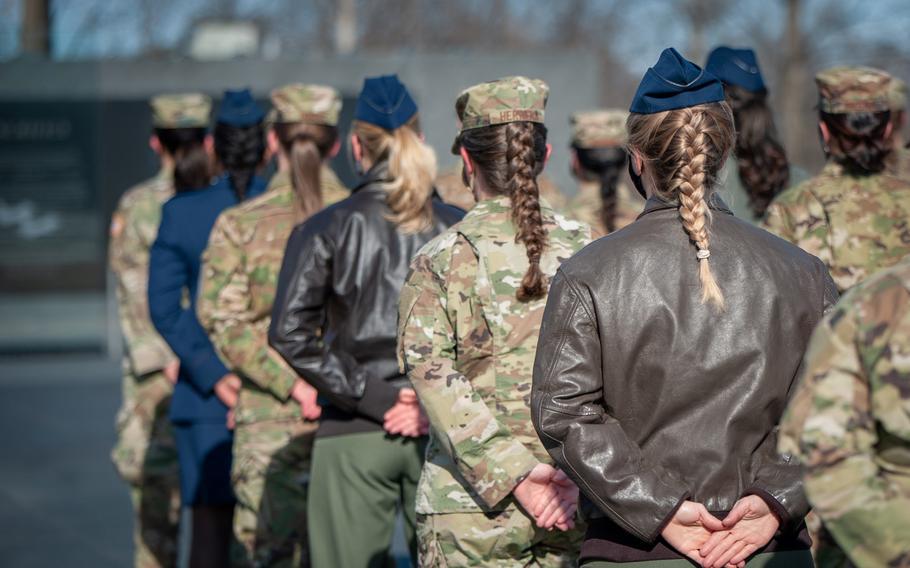
Nearly 45% of female veterans in homeless programs offered by the Department of Veterans Affairs in fiscal 2023 had documented histories of sexual trauma in the military, according to VA officials. (Jaimee Freeman/U.S. Air Force)
WASHINGTON — Nearly 45% of female veterans in homeless programs offered by the Department of Veterans Affairs in fiscal 2023 had documented histories of sexual trauma in the military.
The finding aligns with growing evidence that “sexual assaults and threatening sexual harassment” factor into a rising rate of homelessness among female veterans, according to Terrence Hayes, VA press secretary.
“Many [military sexual trauma] survivors struggle with readjustment issues and disruptions in core areas of functioning and well-being, including difficulties like homelessness,” he said. “Experts point out that many [military sexual trauma] survivors suffer in silence, feel alone in their experience, and have trouble coping.”
Homelessness among female veterans rose by 10% from 2020 to 2022 as the overall number of veterans experiencing homelessness declined, according to the Department of Housing and Urban Development, which provides an annual report on homelessness to Congress.
“Women veterans deal with unique challenges such as having and caring for children, facing the risk of domestic violence, managing financial independence and ensuring employability. These factors can greatly affect their housing stability and increase the likelihood of homelessness,” said Dr. Charles Weber, a psychiatrist and retired Army lieutenant colonel.
“Untreated or under-treated [post-traumatic stress disorder] and military sexual trauma can increase the risk for depression, suicide, substance use and the ability to maintain stable employment or relationships,” said Weber, founder of Family Care Centers, which specializes in mental health treatment for military families and first responders.
Women represent 10% of the veteran population, yet they are the fast-growing group in the veteran population, according to the VA. Their numbers are projected to reach 20% of the veteran population by 2040.
Yet female veterans might not readily identify themselves as former members of the armed forces when seeking housing and other services, which can disqualify them for assistance, Hayes said.
It also is common for female veterans not to disclose an immediate need for housing out of fear they will lose custody of their dependent children, he said.
“Effective strategies to overcome these barriers include employing women veterans as peer support specialists in housing programs to develop rapport and engender trust, and clarifying state and local laws during outreach encounters,” Hayes said.
Depending on where they reside, female veterans with minor children might have difficulty accessing emergency shelter or transitional housing in their communities due to a lack of availability.
“Women also tend to make lower wages than men and have more barriers to full participation in the labor market,” Hayes said.
Women are more likely to serve as primary caregiver for their children than male veterans.
“Women shoulder more of the costs of child-rearing, particularly as single parents,” Hayes said.
The VA’s supportive services for veteran families will provide emergency housing assistance for up to two months in a two-year period.
The housing assistance is essential to ensuring that female veterans do not fall into homelessness, Hayes said.
Women who moved into permanent housing after homelessness often have successful outcomes, according to the VA.
Statistics show 12% of the 38,847 veterans who secured permanent housing through the VA in fiscal 2023 were women.
Yet they represented only 8.3% of the 1,450 veterans who returned to homelessness after receiving VA assistance.